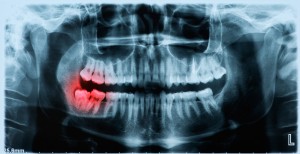 We hear it all the time — why are they called wisdom teeth when all they seem to do is hurt and cause trouble? That doesn’t seem so wise! To help you understand what these four extra molars do, why we have them, and just what’s up with that nickname, we’ve put together a little guide to getting to know these infamous teeth a bit better.
We hear it all the time — why are they called wisdom teeth when all they seem to do is hurt and cause trouble? That doesn’t seem so wise! To help you understand what these four extra molars do, why we have them, and just what’s up with that nickname, we’ve put together a little guide to getting to know these infamous teeth a bit better.
What are wisdom teeth, and where did that name come from?
Wisdom teeth, or the third molars, are a set of four molars in the back of your mouth — two on the top and two on the bottom. They are the last teeth to come in, and generally appear when you’re about 17-25 years old. This is why they’re called wisdom teeth — you’re older and “wiser” when they appear, as opposed to when your other teeth came in.
Okay, so why do we have them?
It’s commonly believed that the third molars were needed by our ancestors to help them eat food that was much rougher, coarser, and harder to chew than what we eat today. As we evolved, wisdom teeth became vestigial, or something that is no longer needed in our bodies for us to function properly. We have other vestigial traits in our bodies, like the appendix and the coccyx, or “tail bone”. We can function just fine without these but, like wisdom teeth and the appendix, we wish we never had them in the first place when something goes wrong!
Why do they always cause problems?
Most young adults worry about their wisdom teeth because they believe there’ll definitely be something wrong with them, and will need to go through a painful extraction process. The good news is that often times wisdom teeth grow in perfectly fine and don’t need to be removed. Sometimes they don’t even grow in at all!
As mentioned above, our diets have evolved as such that we no longer need these extra molars and because of this, our jaws became smaller over time. This is where problems can come into play: with a smaller jaw, there often isn’t room for these large extra molars when they grow in. So, they grow in crooked or don’t emerge past the gums and jawbone — these are called “impacted” wisdom teeth and can affect the health and alignment of your other teeth. They are also particularly susceptible to infection-causing bacteria, as it’s hard to reach back far enough to clean them if they do emerge above the gum line.
Will I need them removed?
Impacted and infected wisdom teeth can cause severe pain and need to be removed. Sometimes your dentist will elect to have your wisdom teeth taken out before they reach a painful crisis point later on. Although extraction or oral surgery is the scary part for some people, these are some of the most standard and common procedures an orthodontist performs.
You will likely be sedated for the procedure, so you won’t feel or remember a thing. After the procedure is over, you’ll need to take it easy for the next few days and consume only liquids and soft foods so as to not disturb the blood clot and prevent swelling. A little bleeding is normal for the first few days and can be managed by swishing your mouth with warm salt water and biting on clean pieces of gauze. Swelling can be soothed with a bag of ice covered in a soft washcloth or towel.
If bleeding becomes heavy, see your orthodontist immediately. Most orthodontists have a 24-hour emergency line for just this reason — don’t be afraid to call it if you suspect something is amiss.
It’s easy to see why wisdom teeth aren’t all that “wise”, but knowing the history of these molars and how they can affect your oral health is important to understanding the choices you can make in their removal, if needed. Remember, it’s possible that your wisdom teeth will come in perfectly fine or not at all, so don’t worry too much about what may or may not happen in the future. Also, regular dental checkups will help catch any problems ahead of time, possibly sparing your more pain down the road. Any additional questions on wisdom teeth? Let us know below!







Leave a Reply